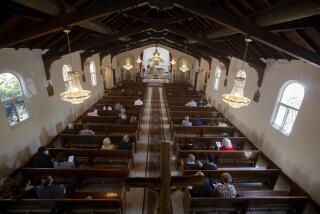Importance of Religious Beliefs Grows as Americans Age
- Share via
As we grow older, our energy, sex drive, memory, income, health and physical senses usually enter a state of gradual decline. But religious belief--and the comfort and happiness it provides--increases with age for most Americans.
Some religious organizations even formalize the process of leadership by their older members by giving them the title “elders,” and for good reason: As people mature, more often than not, they attach more importance to religion and step up their participation in the affairs of organized church life at all levels.
Among the young in this country, belief levels are high, with nearly all people believing in God or a universal spirit. But such beliefs are not always translated into actions until later in life, as the sense of identity with organized religion increases and the focus upon God in this life and the life hereafter becomes sharper.
As Americans grow older, they make firmer choices in religious preference, attend religious activities more often, and think more about how they have led their lives. For nearly every dimension of religious life we have surveyed over the years, an increase generally is found as people mature.
The overall sense of the importance of religion clearly increases as people grow older. More than two in three (69%) 50- to 64-year-olds say religion is very important in their lives, and three of every four people 65 and older feel this way.
Only 8% of the population maintain through their senior years that religion is unimportant in their lives.
These feelings of importance are not just a state of mind but usually are translated into increased involvement in religious affairs.
Nearly three in four of those ages 50 to 64 claim membership in a religious organization such as a church or synagogue (74%), and membership rises to 80% of the people 65 and older.
Similarly, 44% of people ages 50 to 64 attend worship services in a given week, and participation rises to more than half (52%) among those 65 and older.
By comparison, among adults under age 30, just 59% report religious group membership and 32% say they attend worship services during a given week.
For reasons we do not understand, there is a tendency for seniors to gravitate toward Protestant denominations, while the Roman Catholic faith progressively loses its older members.
Over the years we have found that three in 10 young adults and a similar proportion of teen-agers say they are Roman Catholic by preference. But this figure erodes as they grow older.
In 1993, just 23% of those ages 50 to 64 and 20% of those 65 and older said they are Catholics, compared with 30% of those 30 and younger.
At the same time, Protestant churches include 45% of all churchgoers under age 30, more than half of adults 30 to 49, and two in three of those 50 and older.
Given the higher proportion of older adults who are Protestants, it is not surprising to find that people older than 50 describe themselves as “born again” or evangelical Christians increasingly as they age.
In a 1988 survey conducted by Gallup for the Los Angeles Times, the belief that “we will all be called before God at the judgment day to answer for our sins” increased with age.
Of those under 30, only 45% expect to be called to judgment, but this increases to 50% among those 30 to 49, and to 60% by age 50.
A 1990 Gallup Poll found, however, that as people grow older there also is a tendency to believe less in heaven and hell.
Under the age of 16, most people (93%) believe in heaven, but by age 50 just 74% do.
Similarly, 76% of younger teen-agers think there is a hell, but that belief is sustained by just 54% of those 50 and older.
Among senior citizens still believing in heaven, 76% rate their own chances of going there as excellent or good. Among believers in hell, only 5% fully expect to be there when judgment day arrives.


